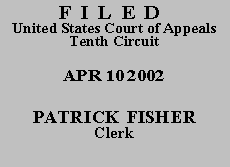

| WILSON TONY HARRELL,
Plaintiff - Appellant, v. L.E. FLEMING, Warden; ELAINE TERENZI, Chief Probation Officer; KATHLEEN HAWKS, Director, Bureau of Prisons; JANET RENO; U.S. PAROLE COMMISSION, Chairman, Defendants - Appellees. |
|
Wilson Tony Harrell, Pro Se.
The Privacy Act "governs the government's collection and dissemination of information and maintenance of its records [and] generally allows individuals to gain access to government records on them and to request correction of inaccurate records." Gowan v. United States Dep't of the Air Force, 148 F.3d 1182, 1187 (10th Cir. 1998). A cause of action arises under the Act when: (1) an error is made in maintaining the plaintiff's records, (2) the plaintiff was wronged by such error, and (3) the plaintiff either knew or had reason to know of the error. See Bergman v. United States, 751 F.2d 314, 316 (10th Cir. 1984). A new cause of action does not arise "upon each and every subsequent adverse determination based on erroneous records," otherwise, "the two-year statute would never run." Id. at 317.
Harrell's claims are based on alleged errors in presentence investigation reports prepared in connection with his criminal convictions in 1982 and 1983, which in turn caused errors in the Bureau of Prison's and the Parole Commission's administration of his sentences. The magistrate judge filed a report and recommendation carefully examining Harrell's progression through the criminal justice system. That report noted that Harrell was clearly aware of the alleged errors on July 29, 1992, when he challenged them during his initial parole hearing.
The magistrate judge therefore determined that the limitations period for a Privacy Act claim began to run on July 29, 1992, and because Harrell did not bring this action until October 12, 1999, recommended that the case be dismissed for lack of jurisdiction. Additionally, the magistrate judge recommended granting the Probation Office's motion to dismiss because it is not an agency as defined in the Privacy Act. See 5 U.S.C. § 552(f)(1) (omitting the judicial branch and its offices from the applicable definition of agency). The district court adopted the magistrate judge's report and recommendation in full and entered an order of dismissal.
After conducting a de novo examination of the record and the applicable law, we agree with the district court's determination that it lacked jurisdiction to consider the case. Failure to file a Privacy Act claim against the government within the statute of limitations is jurisdictional. Dilberti v. United States, 817 F.2d 1259, 1262 (7th Cir. 1987). Congress waived the sovereign immunity of the United States when it enacted the Privacy Act but imposed a two-year statute of limitations. The statute of limitations qualifies the waiver of sovereign immunity and "constitutes a limitation on subject matter jurisdiction." Dahn v. United States, 127 F.3d 1249, 1252 (10th Cir. 1997).
The limitations period began to run when Harrell first became aware of the alleged errors in his presentence investigation reports--July 29, 1992. Harrell did not bring his claim until October 12, 1999, and at that time the district court did not have subject matter jurisdiction to hear his claim. Contrary to Harrell's argument on appeal, the limitations period was not extended either by the government's subsequent actions or by his receipt of documents allegedly corroborating his assertions of error.
Because the district court lacked subject matter jurisdiction to consider Harrell's time-barred Privacy Act claims, we AFFIRM the district court's order of dismissal. Harrell's motion to file a supplemental brief is GRANTED.
1. The case is unanimously ordered submitted without oral argument pursuant to Fed. R. App. P. 34(a)(2) and 10th Cir. R. 34.1(G).